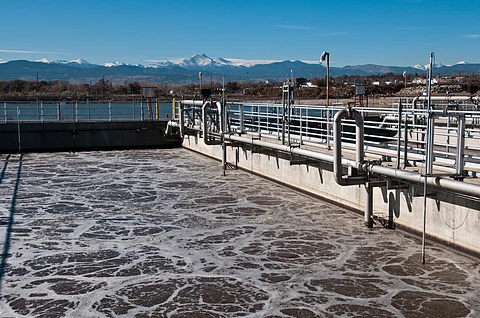
- Topics
- Feature
- Opportunities & Events
- About
- Hindi Portal
- Data
- Topics
- Feature
- Opportunities & Events
- About
- Hindi Portal
- Data

NTPC Dadri declares Noida's treated water project economically and technically unviable to NGT
NTPC Dadri informed the National Green Tribunal (NGT) that utilising treated water from Noida Authority's sewage treatment plants is not feasible, citing significant financial and technical hurdles. A feasibility study, conducted by a private agency, revealed a capital investment of Rs 1,398 crore and an annual operational expenditure of Rs 129 crore, rendering the project economically unviable.
This response came after the NGT, addressing a petition regarding untreated water discharge into the Kondli drain, inquired about the implementation of a 2018 MoU for treated water supply. NTPC argued that infrastructure development, energy consumption, and potential water quality issues, even after tertiary treatment, posed insurmountable challenges. The NGT, aiming to increase Noida's treated water utilisation from 26% to full capacity, is now faced with NTPC's assertion of the project's impracticality. (The Times of India)
Evaluating India's climate diplomacy (2014-2024)
A recent review by the Observer Research Foundation examines India's climate diplomacy from 2014-2024, analysing its strategies, policy coherence, and effectiveness. India balances national development with global obligations, advocating for climate justice and fair burden-sharing. Key initiatives include the 'Panchamrit' commitments and the G20's New Delhi Climate Agenda. India addresses vulnerabilities like water scarcity and monsoon variability, emphasising adaptation and resilience.
The analysis reveals India's role as a bridge between the Global North and South, yet highlights implementation challenges and the need for deeper research into global power interactions and innovative adaptation strategies. Future efforts should focus on strengthening South-South cooperation and promoting green technology. (Observer Research Foundation)
UP drafts policy for treated wastewater reuse
Uttar Pradesh is developing a policy to reuse treated wastewater to combat growing water scarcity. The State Mission for Clean Ganga (SMCG) released a draft for public feedback, emphasising wastewater as a resource, not a liability. With 144 operational and 73 under-construction sewage treatment plants, the state aims for practical and effective reuse in agriculture, industry, and groundwater recharge.
SMCG stresses stakeholder cooperation for optimal implementation, recognising the policy's importance for sustainable water management in India's most populous state. (The Times of India)
Karnataka mandates buy-back of plastic water bottles
Karnataka will require bottled water companies to buy back used plastic bottles to combat environmental pollution. Environment Minister Eshwar Khandre highlighted the threat of reckless disposal, citing Plastic Waste Management Rules 2016. Vendors must offer a nominal fee for used bottles, promoting recycling and reducing roadside litter.
This initiative follows successful plastic control in forest reserves. The government emphasises "Extended Producers' Responsibility," ensuring manufacturers manage their product's lifecycle. This aims to curb single-use plastic and protect water bodies. (The Times of India)
Green Hydrogen Mission's success: Innovation, investment, policy
India's National Green Hydrogen Mission, aiming for global leadership, faces challenges despite budget allocations. Success hinges on innovation, investment, and policy reforms. Utilising water and biomass, green hydrogen production requires cost optimisation. The budget's focus on capacity building necessitates efficient fund utilisation.
Private investment is crucial but hampered by low returns. Green banks and carbon markets, under Article 6 of the Paris Agreement, offer financing solutions. India must develop certification standards and forge partnerships to leverage carbon trading, ensuring the mission's viability. (Down to Earth)
NGT demands detailed water usage reports from cricket stadiums, emphasising sustainable practices
The National Green Tribunal (NGT) has intensified its scrutiny of water consumption by cricket stadiums, demanding comprehensive reports on freshwater and treated water usage. This directive stems from concerns over the excessive reliance on freshwater, particularly groundwater, for pitch maintenance amid increasing water scarcity. The NGT has ordered cricket associations to:
Cricket stadiums to disclose detailed monthly and yearly water consumption, including the total volume used for ground irrigation.
Stadiums must specify the proportion of treated sewage water and freshwater used, revealing the ratio of recycled to fresh water.
A breakdown of freshwater sources, including groundwater extraction, municipal supply, and other sources, is required.
Stadiums must report on the status of rainwater harvesting systems, indicating whether they are installed and actively used.
Stadiums must justify their continued use of freshwater despite scarcity.
The NGT's action follows findings that many stadiums lack operational RWHS and heavily rely on freshwater. This ruling connects to previous NGT orders from 2021, which aimed to regulate groundwater extraction and promote rainwater harvesting. This new order arose from both older petitions, and new concerns over water use during water crises, such as the one in Bengaluru. The NGT's aim is to push cricket associations towards sustainable water management practices. (The Indian Express)
NGT demands pollution and encroachment removal at Ludhiana's sacred ponds
The NGT has ordered immediate action to remove encroachments and pollution from Alamgir village's five ponds in Ludhiana, Punjab. Despite prior orders, illegal structures persist, prompting the NGT to demand swift removal and pond rejuvenation. The tribunal mandates sewage treatment, effluent management, and fencing to prevent future land grabs.
Authorities must submit detailed action reports. The village, home to Gurdwara Manji Sahib and a sacred spring, faces severe pollution, threatening its historical and religious significance. The NGT aims to restore the ponds and protect them from further degradation. (The Times of India)
This is a roundup of policy updates from the 15th March 2025 to 31st of March 2025. Read our news updates here